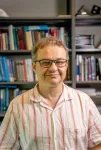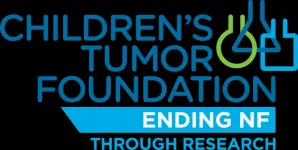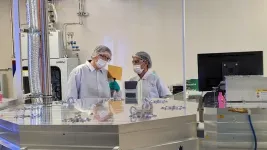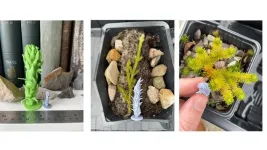(Press-News.org)
In an article published yesterday in the prestigious journal Science, leading researchers from the University of Waterloo, University of Toronto, Yale University and the University of Pennsylvania look at how AI (large language models or LLMs in particular) could change the nature of their work.
“What we wanted to explore in this article is how social science research practices can be adapted, even reinvented, to harness the power of AI,” said Igor Grossmann, professor of psychology at Waterloo.
Grossmann and colleagues note that large language models trained on vast amounts of text data are increasingly capable of simulating human-like responses and behaviours. This offers novel opportunities for testing theories and hypotheses about human behaviour at great scale and speed.
Traditionally, social sciences rely on a range of methods, including questionnaires, behavioral tests, observational studies, and experiments. A common goal in social science research is to obtain a generalized representation of characteristics of individuals, groups, cultures, and their dynamics. With the advent of advanced AI systems, the landscape of data collection in social sciences may shift.
“AI models can represent a vast array of human experiences and perspectives, possibly giving them a higher degree of freedom to generate diverse responses than conventional human participant methods, which can help to reduce generalizability concerns in research,” said Grossmann.
“LLMs might supplant human participants for data collection,” said UPenn psychology professor Philip Tetlock. “In fact, LLMs have already demonstrated their ability to generate realistic survey responses concerning consumer behaviour. Large language models will revolutionize human-based forecasting in the next 3 years. It won’t make sense for humans unassisted by AIs to venture probabilistic judgments in serious policy debates. I put an 90% chance on that. Of course, how humans react to all of that is another matter.”
While opinions on the feasibility of this application of advanced AI systems vary, studies using simulated participants could be used to generate novel hypotheses that could then be confirmed in human populations.
But the researchers warn of some of the possible pitfalls in this approach – including the fact that LLMs are often trained to exclude socio-cultural biases that exist for real-life humans. This means that sociologists using AI in this way couldn’t study those biases.
Professor Dawn Parker, a co-author on the article from the University of Waterloo, notes that researchers will need to establish guidelines for the governance of LLMs in research.
“Pragmatic concerns with data quality, fairness, and equity of access to the powerful AI systems will be substantial,” Parker said. “So, we must ensure that social science LLMs, like all scientific models, are open-source, meaning that their algorithms and ideally data are available to all to scrutinize, test, and modify. Only by maintaining transparency and replicability can we ensure that AI-assisted social science research truly contributes to our understanding of human experience.”
END
‘Weed early and often’ is the key to a productive garden. Interestingly, certain species of ants are also avid gardeners, a practice they’ve refined over 50 million years. They too weed their underground fungus gardens, but how they know what to weed out has been a mystery. Now, a multidisciplinary team of scientists report in PNAS on June 15 how ants distinguish the good fungus from the bad.
People rely on sight to identify weeds but ants grow fungus underground in the dark and must have other ways to sense undesirable garden denizens. A team led by Jonathan Klassen, Ph.D., at the ...
Biological treatment processes are critical for sewage purification, wherein microbial interactions are tightly associated with treatment performance. Previous studies have focused on assessing how environmental factors (such as salinity) affect the diversity and composition of the microbial community but ignore the connections among microorganisms. To fill this gap, an international team of researchers conducted an in-depth analysis of microbial interactions at elevated salinity in activated sludge systems.
Biological ...
HOUSTON – (June 16, 2023) – Rice University chemist Anatoly Kolomeisky has won an award from the National Science Foundation to investigate how heterogeneity affects chemical and biological processes. The goal of his project is to develop analytical models that quantify the role of heterogeneity in various phenomena including catalytic reactions, antimicrobial peptides, early cancer development and lysis, a process describing cellular membrane breakdown.
“We live in a world of heterogeneity,” ...
BOSTON – New research from Boston Medical Center found a significant correlation between biomarkers in the vitreous humor of the eye and pathologically confirmed cases of Alzheimer’s disease (AD) and Chronic Traumatic Encephalopathy (CTE) in post-mortem brain and eye tissue. Published in IOS Press, this exploratory study indicates that biomarkers in the vitreous humor may serve as a proxy for neuropathological disease.
The incidence of dementias like AD continues to rise. As of 2021, 6.2 million North Americans above 65 years of age are suffering from AD, and this number is projected to reach 13.2 million by 2060. Diagnosis of both AD and CTE is based on symptoms, clinical exam ...
The Children’s Tumor Foundation (CTF) has announced that Brigid Garelik, MD, MPH, has been appointed Chief Medical Officer, overseeing the Foundation’s research and clinical initiatives. In this role, Dr. Garelik will set direction for the Foundation’s innovative R&D programs, developing effective clinical and preclinical strategies in order to deliver treatments to patients. She will also direct the Foundation’s educational programs in support of NF healthcare professionals, growing the NF field, and R&D related patient engagement. She will report to the President of the Children’s Tumor Foundation, Annette Bakker, PhD.
Dr. Garelik is an accomplished ...
A new SGD 77 million research initiative has been launched today at the National University of Singapore (NUS) to boost innovation and research on advanced solar cell technologies in Singapore. Over the next five years, the REC@NUS Corporate R&D Laboratory for Next Generation Photovoltaics (REC@NUS Corp Lab), which is jointly set up by the Solar Energy Research Institute of Singapore (SERIS) at NUS and REC Solar (REC), will research, develop, and commercialise disruptive solar photovoltaic (PV) technologies based on perovskite-silicon tandem solar cells.
Supported ...
A chemical linked to a higher risk of leukemia and other blood cell cancers creeps into millions of homes whenever residents light their gas stoves. A new Stanford-led analysis finds that a single gas cooktop burner on high or a gas oven set to 350 degrees Fahrenheit can raise indoor levels of the carcinogen benzene above those in secondhand tobacco smoke. Benzene also drifts throughout a home and lingers for hours in home air, according to the paper published June 22 in Environmental Science & ...
Leaf arrangements in the earliest plants differ from most modern plants, overturning a long-held theory regarding the origins of a famous mathematical pattern found in nature, research shows.
The findings indicate that the arrangement of leaves into distinctive spirals, that are common in nature today, were not common in the most ancient land plants that first populated the earth’s surface.
Instead, the ancient plants were found to have another type of spiral. This negates a long held theory about the evolution of plant leaf spirals, indicating that they evolved ...
About The Study: The results of this study suggest that Black veterans have lower rates of lung cancer screening that are not fully explained by demographic and socioeconomic variables, underscoring the need for further qualitative studies on barriers to lung cancer screening as well as evidence-based interventions targeted to Black veterans.
Authors: Neelima Navuluri, M.D., M.P.H., of the Duke University School of Medicine in Durham, North Carolina, is the corresponding author.
To access the embargoed study: ...
About The Study: The findings of this qualitative study suggest that institutional plans to protect frontline clinicians from the responsibility for allocating scarce resources may be unworkable, especially in a state of chronic crisis. Efforts are needed to directly integrate frontline clinicians into institutional emergency responses and support them in ways that reflect the complex and dynamic realities of health care resource limitation.
Authors: Catherine R. Butler, M.D., M.A., of the University of Washington in Seattle, ...




